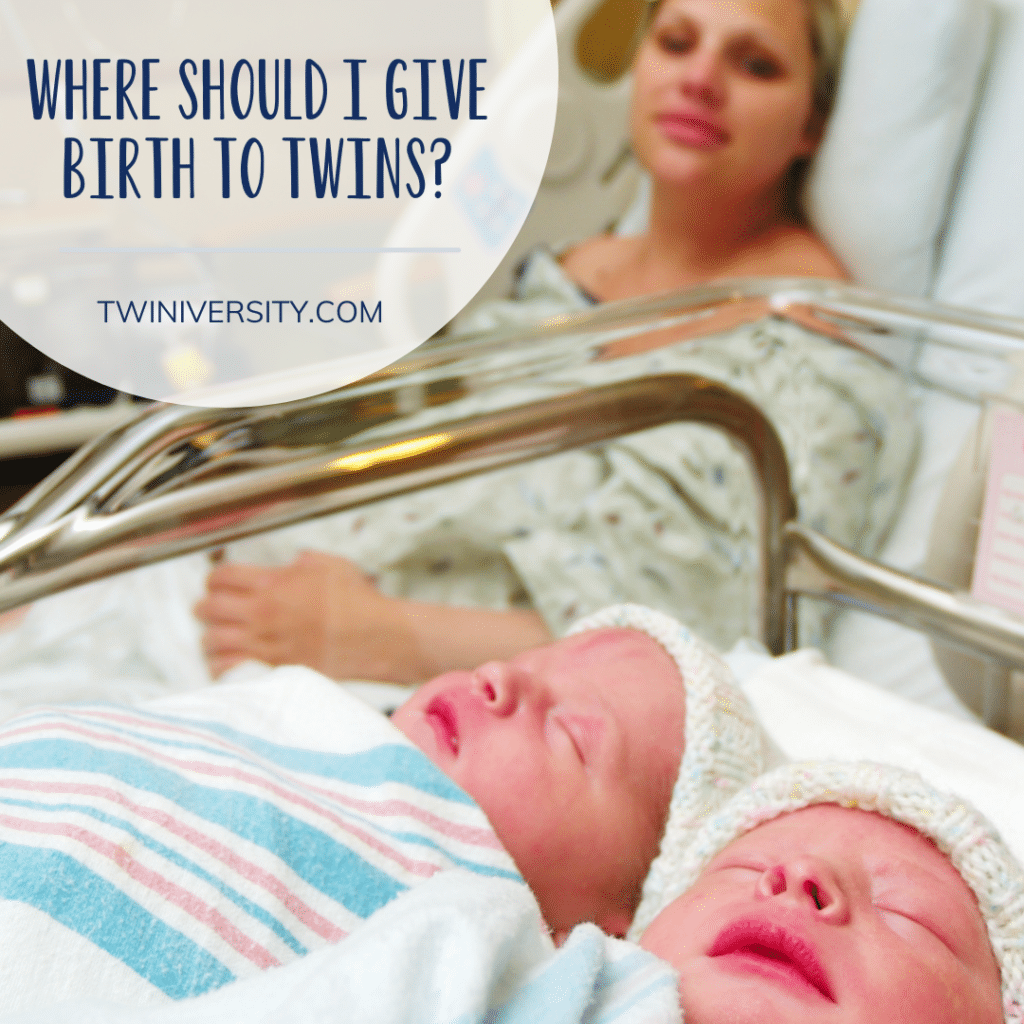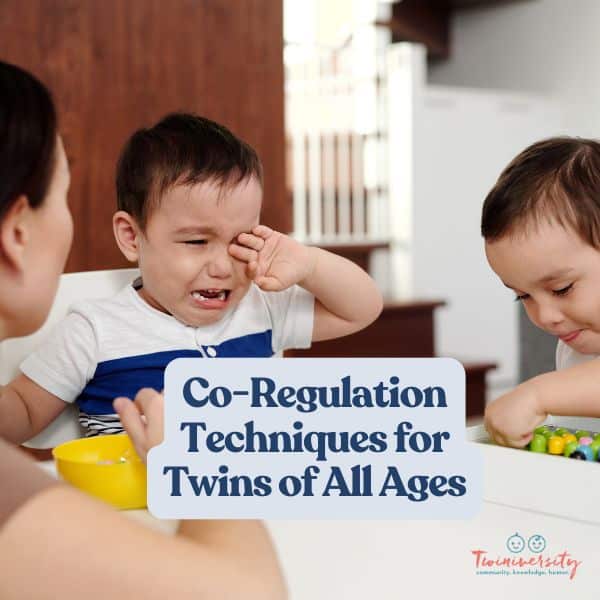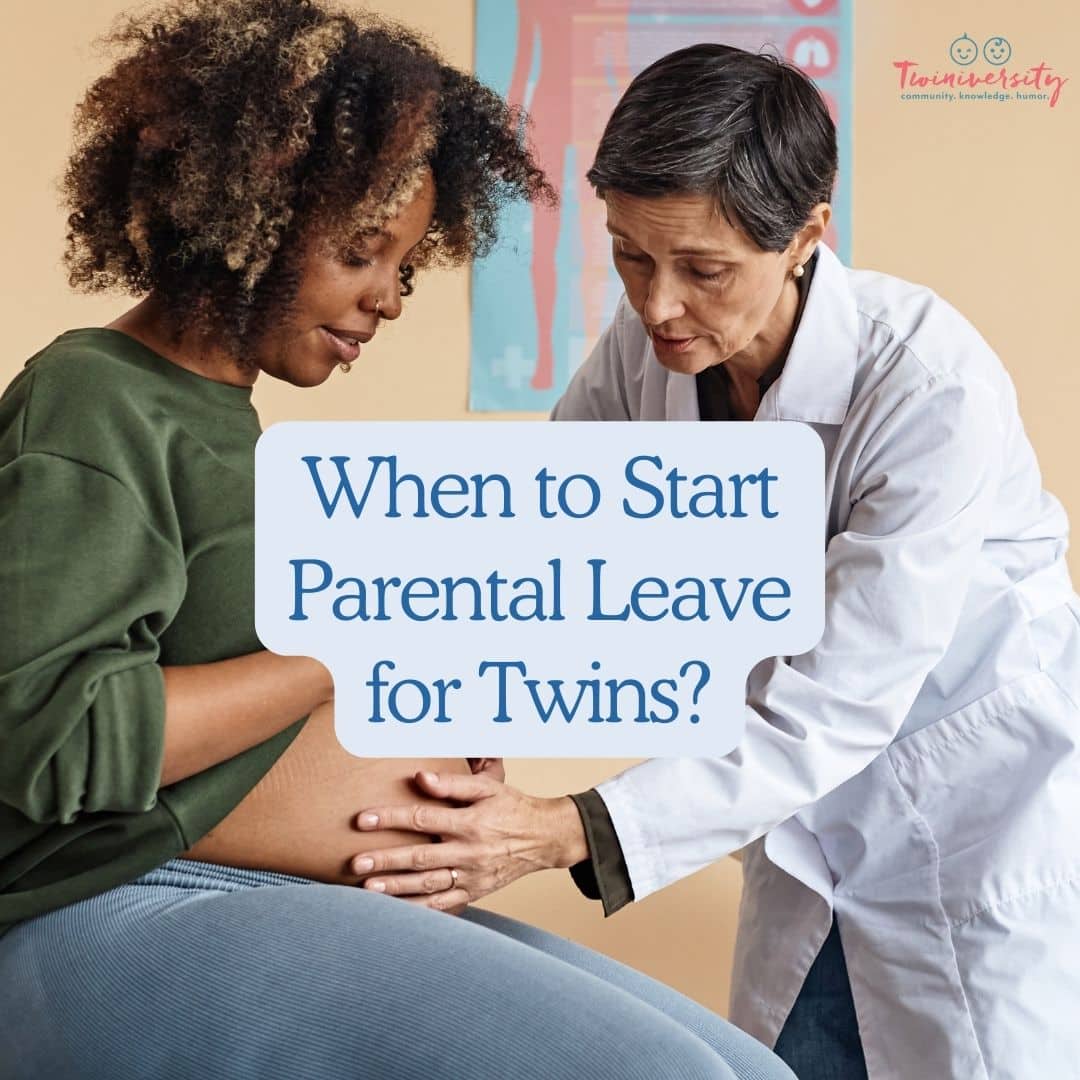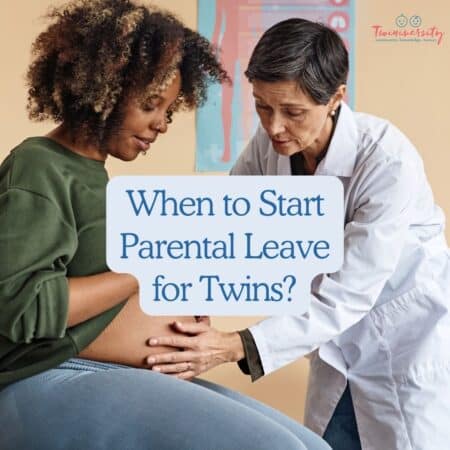Last updated on February 14th, 2024 at 11:06 pm
The ultrasound has confirmed it, and even if you’re still in disbelief, you really are having twins! That means you probably have a lot of questions, including where you should give birth to your twins.
While it is ultimately your choice, twin pregnancy can be complicated. Before making your decision, be sure to learn all you can about delivering twins safely. To help, we’ve covered some of the major points to help you decide where to give birth to your twins.
Will Having Twins Change My Labor and Delivery Plans?
Most people go into pregnancy with an idea of how and where they would like to deliver. Birthing choices are highly personal and your preferences determine your particular birth plan. Whatever you envisioned, the tough truth is that twin babies might throw a wrench in your carefully laid delivery plans. Even if you’ve had uneventful pregnancies in the past, having multiples changes the game.
Twin pregnancy increases your risk of many complications, including preterm labor, premature birth, low birth weight, and labor complications. Twins also often require more frequent monitoring and have an increased chance of emergency C-section. Although it’s possible to have an unmedicated and/or vaginal birth, as long as everyone cooperates.
RELATED: What’s the Difference Between a Vaginal Delivery and a Planned C-Section?
The babies’ fetal presentation, or positioning in the womb, will determine whether you can have a vaginal birth or if you’ll need a C-section, especially if either of the babies is breech or transverse. Positions can change throughout your pregnancy, right through delivery day. This is why you should educate yourself on the double-whammy delivery. That way you’re prepared if one comes out naturally and the other needs some help.
All of these considerations will dictate how and where you give birth to your twins. Depending on your pregnancy, things might end up different than what you originally planned.

Have you taken your expecting twins class yet? We offer a great class on demand so you can take it on your own schedule! There are so many video modules covering everything from your twins’ baby registry to your first week at home with twins! Sign up today to get started before your twins arrive.
Does the Type of Twins I’m Having Affect Where I Give Birth?
The type of twins you’re having will impact your risk factors and affect your options for giving birth. Di-di twins, which are most commonly fraternal, each have their own placenta. These type of twins often carry only a little more risk than a singleton pregnancy. Therefore, fraternal twin pregnancies allow for more flexibility in safe delivery practices.
Identical twins, which can be mono-di or mono-mono, carry additional risks due to a shared placenta, such as sIUGR, TTTS, and TAPS, to name a few. Due to these complications, experts recommend mo-mo and mo-di pregnancies do not go past 37 weeks. Consequently, identical twins often require neonatal care after birth. As a result, it will be difficult to find a provider who will deliver identical twins outside of a hospital.

Can I Give Birth to Twins at Home?
Twin home births are on the rise for a number of reasons. Hospital restrictions in the COVID-19 pandemic, distrust in the medical community, increased desire for autonomy, and financial concerns have all led to more families choosing home birth.
At Twiniversity, we do not recommend a twin home birth. This is because it’s not the safest option for you and your babies. With the chances of complications for both babies and mom, it’s just too risky.
On top of that, accessibility is a huge issue. No doctor is coming to your house so you must hire a midwife (please don’t try to do it alone!). Many states have laws restricting the ability of midwives to attend the birth of twins, let alone a home birth of twins. Trying to evade these restrictions puts both parties at risk. If you’re in the US, check the status of your state laws with the Midwife Association of North America.
In the end, the decision is entirely yours. Just be sure to do your research and have back-up plans should an emergency arise.
Can I Give Birth to Twins at a Birth Center?
In contrast to a hospital, a birth center offers a homey, low-intervention labor and delivery experience. It’s an ideal choice for low-risk pregnancy. Care is typically provided by midwives and supported by OBs as needed. Birthing centers also offer accommodations many hospitals don’t. This includes more birthing options, cozier rooms, more privacy, and freedom.
Even with these amenities, most birth centers aren’t the safest choice for twin pregnancies. Simply put, they are not equipped to handle the potential complications of multiples labor and delivery. Also, unless they are attached to a hospital, most birth centers don’t have a NICU on site. As a result, many healthcare providers choose not to deliver twins at a birth center, especially identical twins.
That said, a Certified Nurse Midwife in a birth center can be an option for an uncomplicated fraternal twin pregnancy. Be sure to find a healthcare provider skilled in twin delivery. If you go this route, experts recommend you always have a back-up plan and preferred hospital ready to go, ideally one affiliated with your birth center.

What Is the Safest Place to Give Birth to Twins?
We’ve all heard stories of twins delivered safely in a car, at home, or in a birth center. That said, it’s our opinion that the safest place for twins’ labor and delivery is a hospital with a robust medical care team and the ability to handle an emergency. No pregnancy is without risk, but a multiples pregnancy almost always carries a higher chance of complications and NICU time. When complications arise in a hospital, they can be addressed swiftly, ensuring the safest birth experience for your twins.
Furthermore, your babies aren’t the only ones at risk. Twin pregnancy also carries higher risk of maternal complications. Placental abruption, placenta previa, preeclampsia, cord prolapse, and postpartum hemorrhage can all occur at any point. So a hospital is likely the safest option for you or your partner as well.
Another thing to consider is the length of twin pregnancy. Although twins often come early on their own, sometimes they need a little help and induction is necessary. The safest place to induce a pregnancy is a hospital. You might have concerns over inducing them early but try to remember the end game: a safe labor for you and a successful delivery for them.
Of course, this can be a tough pill to swallow if you’ve already delivered at home or in a birth center. Or if you’ve had your heart set on a totally natural home birth and ended up with a scheduled C-section 5 weeks early (like me). Remind yourself that a hospital birth doesn’t mean you’re giving up all your power, you’re just giving yourself the best odds for a happy and healthy twin birth. Don’t be afraid to advocate for yourself, but try to trust your doctors too.
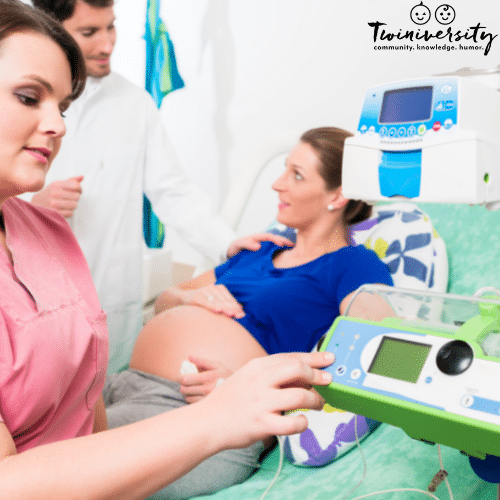
Which Hospital Should I Choose to Deliver Twins?
One of the primary risks of a multiples pregnancy is premature birth, often before 38 weeks, resulting in developmental complications. As a result, your twins might require neonatal care after birth. Commonly referred to as “NICU time” about 1 in every 4 twins requires this specialized care. Although NICU time is not always needed for twins, accepting the risk will help you determine the safest place to give birth to your twins.
Not all hospitals have a NICU and not all neonatal care facilities are the same. There are four different types of neonatal care levels:
- Level I (Well Newborn Nursery) provides basic newborn care, ideal for healthy, full-term babies that require no intervention after birth. If your hospital only has a Level I nursery, find others in your area or prepare for potential transfer.
- Level II (Special Care Nursery) cares for babies born at or after 32 weeks who weigh more than 3.3 pounds. These babies have little to no complications aside from prematurity. Babies born before 32 weeks might visit a Level II nursery briefly for stabilization before transfer.
- Level III (NICU) are equipped to handle most post-birth complications of multiples pregnancy. This includes growth and feeding issues and respiratory support. They can also address critical illness and the need for surgery.
- Level IV (Regional NICU) facilities offer a full range of healthcare services including access to various pediatric specialists. They offer the highest level of care for babies with severe needs due to birth defects or other disorders.
The safest option for delivering twins is a hospital with a Level III NICU. These facilities have the ability to provide care in the event of premature birth or other complications.
Your local hospitals may have varying degrees of neonatal care facilities so research your options before deciding. Be sure to confirm that your OB or midwife has privileges at your preferred choice. Ideally, choose a hospital that is in close proximity to your home. If you travel in your third trimester, research the hospital and NICU options there as well in case you experience symptoms of preterm labor.
Consider Safety First When Deciding Where to Give Birth to Twins
Twin pregnancy can be scary and unpredictable, but one thing you can prepare for is where you’ll give birth. Start early researching OBs, hospitals, and NICU availability in your area. Discuss the expectations for your multiples pregnancy during your prenatal doctor’s appointments. Most of all, try not to worry too much. Doctors understand how hard it is to give up on your dream delivery day. As such, they will help you form a plan that focuses on the healthiest outcome for your family.

